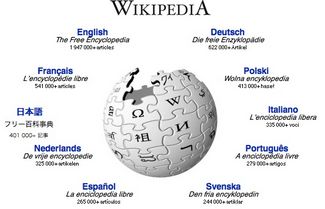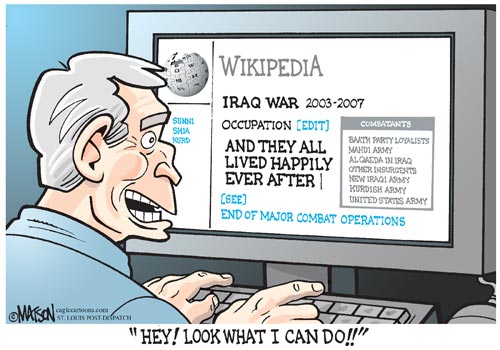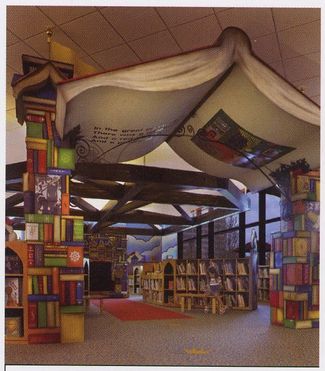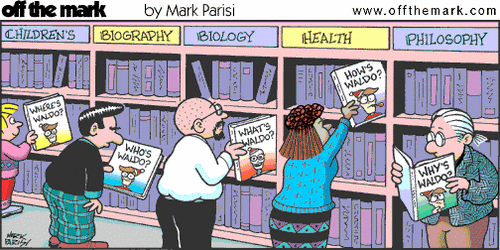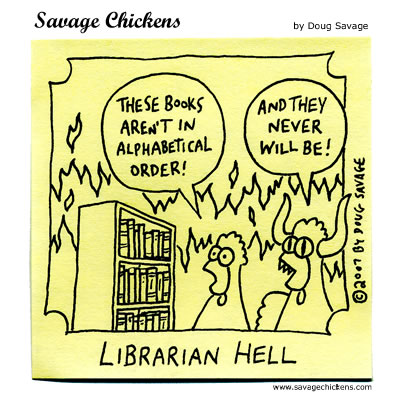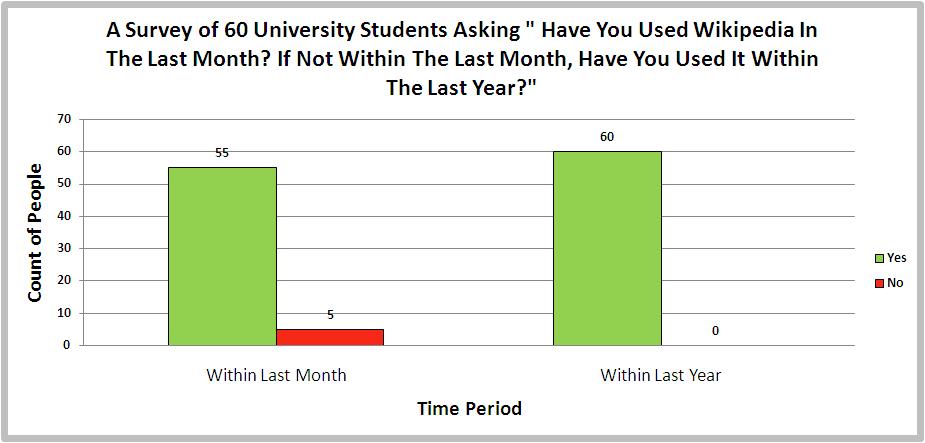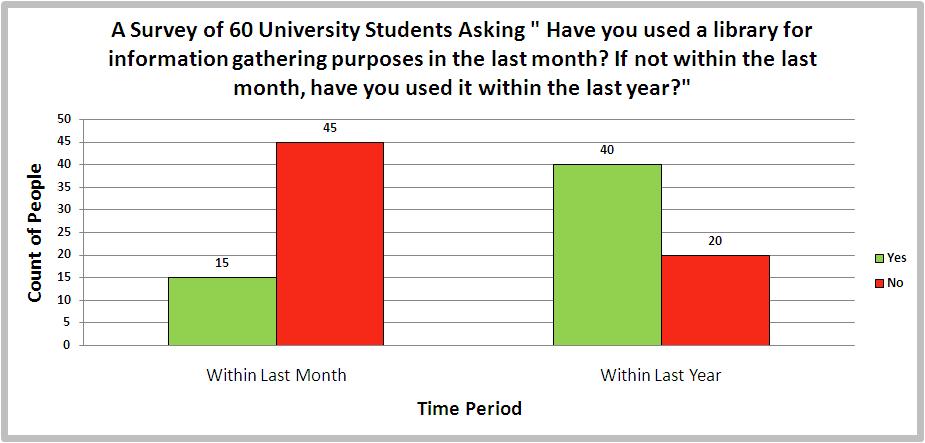Libraries vs. Wikipedia
Contents
Group Members
Robbie Antle, Talya Grewal, Jonathan Mah, Charmayne Rojas, Devin Soon, Sherry Yang, Nicholas Hui
Libraries vs. Wikipedia
What is the better resource?
As a group, through our research we have come to an agreement that wikipedia is the superior tool when it comes to research. Due to its easy accessibility and the large database that can be used by anyone and everyone looking to find information on almost any topic.
What is Wikipedia?
Wikipedia is a massive online encyclopaedia and one of the most popluar Wiki’s created by Ward Cunningham out there. It is easily accessible, simple to use, and editable! Just like the meaning of Wikiwiki, “fast, speedy; to hurry, quick fast, swift.” Out of the millions of articles, there are currently 2,276,049 in english. The search box on its main page allows anyone to quickly and effectively access the information you want. Wikipedia also utilizes a content box, enabling you to see the topics that are discussed. There are currently 253 language editions of Wikipedia, each hold a large number of articles. The high usage of Wikipedia has made it one of the top 100 websites of the world and also one of the top reference websites.
Pros & Cons
- Pros:
- unlimited information
- endless resources
- when searching for one topic, it will have more subtopic to branch into and has more detail and focus into the topic
- it is much easier to find all the information needed in ONE website without all the flashy advertisements or pop-up commercials on other websites
- has one of the easiest editing format
- everyone is welcome to access
- Cons:
- not everything can be found
- sometimes information is not accurate
- at times result will be a stub article, which has very little information to relate to topic
- articles can be created by anyone; therefore a lot of times grammar is wrong or too much personal opinions
- if so the article cannot be taken seriously, sometimes the information is not true, but this is very obvious because people usually put their resources in the bottom of the page, if not then it’s most likely to be a fake
The Future of Wikipedias
In the world today everyone is looking for the fastest way to do things. Therefore when it comes to searching for information, Wikipedia is one the first places people go, to seek information. Wikipedia is an online encyclopedia that allows anyone to put up information, and edit pages without a supervisor or censor. Hence why it is seen to be inaccurate filled with untrusting resources. The founder Jimmy Wales says; “I want to get the message out to college students that they should not use Wikipedia for class projects or serious research.” On average Wales gets ten emails a week from students who complain that Wikipedia has been the cause of academic misbehavior, because they sourced Wikipedia and the information was wrong.
Although day-to-day Wikipedia can seem useful for retrieving simplistic information and definitions, it is far from perfect. It seems that with time the future of Wikipedia is in the hands of marketers and gamers. Inevitably its value of having everyone and anyone provide information, and edit content will be the reason behind Wikipedia loosing all creditability. As seen previously with community-driven communication tools such as; USENET and Open Directory Project, Wikipedia will be the next take over by gamers and marketers. Initially markets will overload links into Wikipedia with no boundaries to editing. This will lead to the build up of scripts to edit Wikipedia pages created by marketers in which they will fill with links that attack Wikipedia. The self-policing community of Wikipedia will delete these attacks like we delete spam from our emails. However over time the Wiki community will be reluctant to undoing marketers attacks over and over again. This will then result in two ways. The first way leaving Wikipedia with no choice but to lock down pages from being edited or to hire a reputational management system to limit the rights of posting or editing content on Wikipedia. Secondly less clean-up of span will lead to a decrease in credibility, decreasing community member’s incentive to clean up pages. Either way Wikipedia has to realize eventually there will have to be some sort of gatekeeper to maintain its survival.
What is a Library?
A library is defined as a place set apart to contain books, periodicals, and other material for reading, viewing, and listening. It also serves as a place where you can study or use for references. Any individual is able to access a library and use its resources, but in order to borrow the material one must have or apply for a library card. Most libraries have specialized sections that are easily accessible that make it all the more efficient when searching. Libraries provide a diverse selection of material. Along with the help of computers, there are professional librarians that provide assistance when needed. Overall, a library’s primary role is to provide a place open to the public full of information and knowledge.
Pros & Cons
- Pros:
- Libraries carry professionally edited and published books and magazines. Unlike a good majority of the material on Wikipedia.
- Most Libraries have hired staff to assist you in finding your resources.
- Most libraries have quiet study rooms where you can go to read without distractions.
- Libraries tend to be divided into areas of interest. A very common library format involves having fictional reading positioned on one end and Non-fiction at the other. Non-fiction books tend to be located closer to the information desk because there are more categories for Non-fiction books then there are Fiction categories so assistance is more commonly needed to navigate through Non-fiction shelves.
- Modern libraries carry a large variety of books for both study and recreation.
- Modern Libraries now also let you borrow DVDs,CDs,Videos,Newspapers,Book CDs, Books in MP3 format, Books in other languages, Encyclopedias, Local History Materials and "Talking Books" for the visually impaired. Which you can put on your Ipod and then return.
- Under special circumstances most Libraries will allow an extended loan on the resource you borrow. These special circumstances include vacation and hospital stay.
- 24 hour Chutes are available to return your books so that you do not have to return books during service hours.
- On-site Computer systems help make the search for the desired resource easier.
- If you want to borrow an item that is checked out to another customer, or one that is not available at your location, you can place a "request" on it. When your "request" is available, you can be notified by either automated telephone message or by email.
- Most Modern Libraries now have
- Internet Access
- Enhanced Information Services on the authenticity of the resource you are borrowing
- Photocopiers
- Private Room Rentals
- Story time readings for younger children
- School visits
- Book Clubs
- Homework Help Clubs
- Cons:
- You have to travel to the Library.
- If the book you want is being used by someone else you have to wait for it to be returned.
- You have to search through the Library to find the resource you want.
- Although there are books written in other languages found in the library a vast majority of the resources you will find are written in English and cannot be translated at the click on a button.
- If you should accidentally damage the resource while it's in your possession a damaged item cost is due.
- Should you lose the book while it's in your possession you would have to pay the replacement cost. Which varies for each book.
- You can only take out a book during the libraries service hours. Which tend to be limited, especially on Sundays.
- Line-ups do occur while waiting to sign out your resource.
- The condition of your resource is not always premium. For example, CDs and DVDs might be scratched and books might be missing pages
- The Average Library in Calgary charges $5 for a library card. Replacing the card will also cost $5
- The Average Annual Fee for library use in Calgary
- Adult $12
- Senior(65+) $9
- Young Adult(ages 13-17) $6
- Child (age 12 and under) FREE
- Non-Resident (not paying Calgary Property or business taxes) $112 for a family
- To get a library card you need two pieces of identification, one with your current address( which shows that you are a resident of Calgary in order to get reduced costs).
- If you are under 18 years old a parent or guardian will have to sign for you before you can get your card.
- At most Calgarian Libraries
- You can keep Books, CDs and other materials for only 3 weeks before having to renew them. Failing to renew them will result in a fee. DVDs can only be kept for one week.
- Loan Limits for most Calgarian Libraries
- DVD - 30adult and 30children DVDs at a time
- No more then 99 total items.
- Overdue Items Cost for most Calgarian Libraries
- Adult items ... 35cents per day
- All DVDs ... 50 cents per day
- Young Adult items ... 20 cents per day
- Children items ... 15 cents per day
The Future of Libraries
With the growth and more importantly the speed of growth in technology today, people are demanding information faster and there is a higher demand for it then ever before. Where as 50 years ago in order to do any sort of research or information gathering the first place a person started was the library, now the first thing people do is search it on the internet. Slowly the community libraries are pushed to the back of peoples minds, only used as a last resort. They have become obsolete for lack of a better word. There are good changes however in libraries in an attempt to keep up with times. Most libraries have computer stations for people to search information online. They not only have books now but have sections for DVD's and CD's. Libraries are becoming more efficient as well, to the point where a person may even search for a books availability and even place it on hold online before ever having to leave their home. Is this enough to save libraries? No one is sure of the answer to that. Only time will tell.
Libraries vs. Wikipedia Survey
Wikipedia Survey
- According to the survey conducted, it was found that the use of Wikipedia across the University campus plays an important role in the lives of students in regards to information and research with 92% of students having used Wikipedia within the last month, and 100% of the students having used Wikipedia within the last year.
Library Survey
- According to the survey conducted, it was found that the use of Libraries across the University campus play a smaller role in the lives of students in regards to information and research with only 25% indicating Library use within the last month, and with a slight improvement of 67% indicating Library use within the last year.
Conclusion
Most people agree to use Wikipedia for research, because it is a much easier approach. As for libraries, their use is slowly decreasing mainly because of the extra work it takes people to travel there in order to use their resources and the time it takes people to search for specific material. The advancement of technology is causing it to be much easier and more efficient to just use online resource tools within their own home. Therefore for researching related duties, it is much easier to go for online libraries and dictionaries such as Wikipedia rather than going to a library.
Resources
- Robbie:
- http://findarticles.com/p/articles/mi_m1387/is_n3_v42/ai_15161653
- http://education.zdnet.com/?p=73
- http://www.calgarypubliclibrary.com/
- http://www.openingthebook.com/otb/page.asp?idno=211
- http://www.libdex.com/country/Canada.html
- http://www.cla.ca/AM/Template.cfm?Section=Grants&Template=/CM/HTMLDisplay.cfm&ContentID=3164
- Talya:
- Jonathan:
- Char:
- Devin:
- Sherry:
